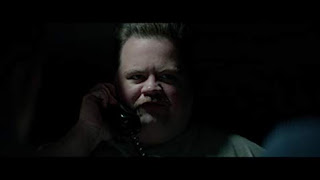His recent work, while inconsistent, is remarkable if for no other reason that the man is still making top notch productions into his late '80s. For instance, his last film -- the enjoyable and eccentric The Mule -- grossed over $100 million, this is simply unheard of.
Still, Eastwood's begun to let his legendary status (and the final cut privileges he enjoys at Warner Brothers) steer him towards some troubling self-indulgent flourishes, leaving many of his recent works, however well-crafted, sullied by a kind of simplistic jingoism, where villains are broadly sketched bureaucrats and shrill, heartless members of the 'elite.'
This tendency was evident in two of his biggest hits -- American Sniper and Sully -- both films that purported to be based on true stories but either made glaring omissions or invented conflicts to prove his point, rather than to serve the story.
Perhaps if these stories were fictional, the cynicism of what he is doing wouldn't be so problematic, but with biopic movies they often have the either the final or most influential word on how their subject is remembered (most people think of Joan Crawford as a monster now, thanks in no small part to Mommie Dearest, for example).
In Richard Jewell, Eastwood turns his hero worship sight on what appears to be a very worthy subject. The late security guard was responsible for finding a bomb planted at the 1996 Olympics in Atlanta, and he saved many lives because of his actions on the scene. However, he was quickly seen as a suspect (if the movie is to be believed, for very thin reasons) and was left to be a media pariah while the FBI struggled to prove their hunch right. Jewell was eventually exonerated and became a poster child for the dangers of trying people by the media.
It's an incredible story -- one that doesn't need a lot of editorializing or embellishment. Eastwood had the good sense to cast the terrific character actor Paul Walter Hauser in the lead, instead of going with a major movie star. And he is very sympathetic as the somewhat socially awkward and naive Jewell. He is matched by Kathy Bates, in a very moving performance as Jewell's mother, and Sam Rockwell in a likable turn as his attorney. So far so good. But the movie's heavy handed take on how and why Jewell was railroaded keep eroding all the movie's strong points.
The worst element it the correctly controversial handling of a conniving reporter character played by Olivia Wilde in an over-the-top, aggressively unlikable performance. It might be one thing if her character is meant to be an amalgam or several others, but she isn't. She is based on a very real (and now deceased, so she can't defend herself) reporter who broke the story that the FBI saw Jewell as a suspect.
 Where do I begin. Not only does the movie take great pains to make her off-putting from the start, but also takes great pains to establish that she was an unethical journalist, even overtly saying that she wasn't above trading sexual favors for a good story.
Where do I begin. Not only does the movie take great pains to make her off-putting from the start, but also takes great pains to establish that she was an unethical journalist, even overtly saying that she wasn't above trading sexual favors for a good story.It's rather galling to see Wilde in this role on the heels of her triumph directing the feminist comedy Booksmart, especially since this is one of the most overtly sexist characters I can remember seeing recently. Literally, she is called out at one point for being "ambitious" as if that's a bad thing, and after some effort is thrown in to redeem her a bit towards the end, there is no real resolution to her character. Eastwood wants audiences to not just hate her, but hate what she represents, when the truth is that the tragedy that befell Jewell had many authors, and perhaps one of them may have been the man himself.
The movie sort of glosses over what character flaws, if any, Jewell had and never allows for any justification or explanation for how the FBI jumped to their conclusions about him. Now, perhaps it really was as thin a case as it appears to have been in the movie (the authorities came to suspect Jewell planted the bomb himself to become a hero for finding it), but I found myself not trusting much of it, especially because of the way the Wilde character is handled.
The film also misses an opportunity to deal with the reality of who really committed the act of domestic terrorism over 20 years ago. The real bomber is named, but the fact that he was motivated by anti-gay, anti-abortion zealotry is conveniently overlooked.
What could have been an exciting, nuanced thriller -- the kind that Eastwood himself has proved himself capable of in movies like Mystic River and A Perfect World -- turns into an over the top screed, a finger wagging movie that suggests that 'real heroes' are often penalized for doing what's right.
Jewell deserved a better movie than this. The Hauser performance is so good that it almost feels like a part of a different movie. And the entire sequence where the bombing occurs is generally suspenseful, but I couldn't help but feel cheated out of what this movie could have been. Had Eastwood stuck to the facts, instead of setting up convenient paper tigers to knock down.


No comments:
Post a Comment